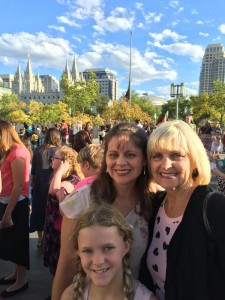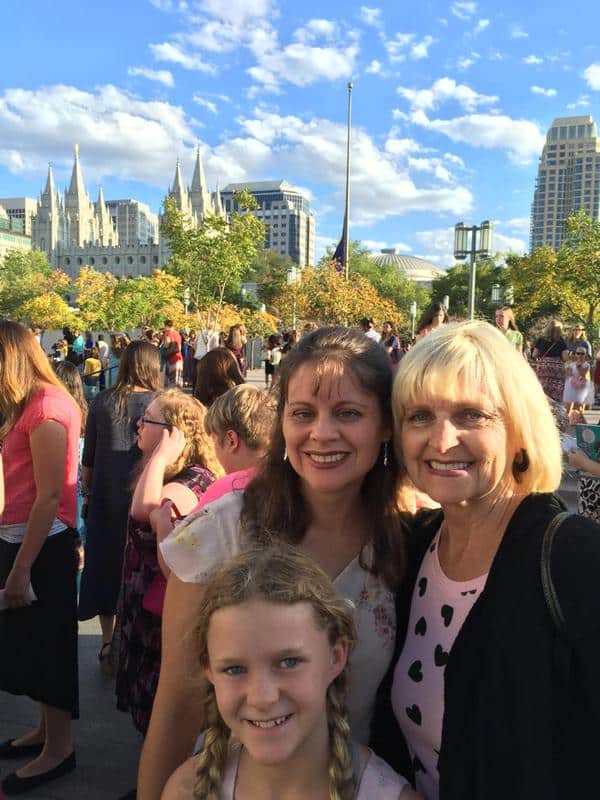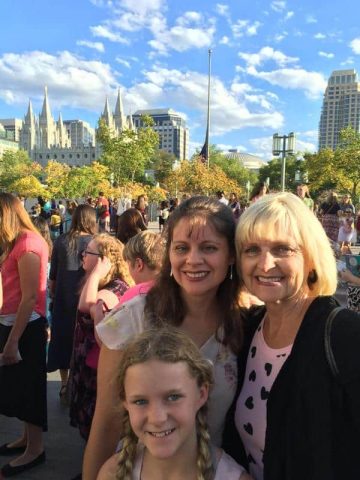
We had a good discussion about General Conference on our backlist. Many of us found inspiration for our own life journeys and were reassured by affirming messages from Church leaders about issues dear to our hearts, such as the status of women in the Church. We had questions about the continued lack of diversity among the Quorum of the Twelve; continued low representation of women among Conference speakers; and the return of the English-only format, ending a short-lived effort at language diversity.
April Young Bennett: President Uchtdorf said all three apostle vacancies will be filled today. I am hoping that the new people will reflect the ethnic, racial and geographic diversity of the Church and I am hoping that the new people will be empathetic to the concerns of women who would like greater inclusion in the Church. After seeing a female friend and mentor become a Community of Christ apostle just a few weeks ago, I also feel sad that I can’t even hope for a woman to be included among our own apostles.
President Uchtdorf reprised the theme that women should simplify their efforts, instead of overdoing unimportant things like handouts. Simplification is always good advice, but I can’t help but wonder if women overdo handouts because we aren’t given more meaningful projects within the Church. Couldn’t we channel that energy into more important efforts if we were better included in the governance of the Church?
I liked that Elder Ballard pointed out that church leaders are neither perfect nor infallible, but they are perfectly dedicated. I believe that is true. I hope this kind of dedication and humility makes it possible for them to consider suggestions from rank-and-file members of the Church. Lately, I have been told by multiple sources that the brethren are so inspired they don’t need women’s input. I hope the brethren themselves don’t feel that way.
I liked that Elder Maynes gave some of his time to his wife, reading what she wrote in her own words, thus giving some of the disproportionately male speaking time to a woman vicariously.
I enjoyed Elder Lawrence’s talk on self-awareness. I was concerned because two of the women he described as examples had stereotypically female flaws: whininess and the tendency to interrupt. (Where have we heard about women talking too much before?) It was an excellent talk, and if the listeners follow his advice, they will be inspired to self-reflect and improve their own self-awareness. I just hope that they don’t use the talk for ill by letting it reinforce any female stereotypes they may already hold. Of course, if someone with this tendency towards bias against women follows the advice in the talk and goes to the Lord to find their own flaws, maybe they will come to recognize their own biases and stop stereotyping!
Liz: I loved Sister Marriott’s talk. It would’ve been really easy to just talk about how “it will all work out” without giving any personal examples that complicate that oft-heard adage. So often we say that “it will all work out” as a way of abdicating any responsibility for each other—like when another person’s grief makes us uncomfortable, whether from death or life circumstances. I like that she talked about how messy things are, and how “it will all work out” doesn’t mean that it will be easy right now. Her talk made me want to do more for other people—to really be there for them between “it hurts now” and “it will all work out.”
Suzette: The best talk was from Sister Neill F. Marriott. I loved her beautiful thoughts on the Savior—and/or relationship with the Savior. (And I loved her silver hair and southern accent.) She spoke of having a broken heart and an open heart. And she spoke of Christ’s immense grace and healing. It was inspiring. “God will take us as we are …. and makes us more.”
What I loved about President Uchtdorf’s talk was that it called for deep personal reflection. I felt he called us all to review ourselves and step up/refocus in the ways that we each personally feel inspired. “Our weaknesses can keep us humble and turn us to Christ. He will take us where we are. And work with us.” I was inspired by: discipleship is a journey.
I liked Elder Larry Lawrence’s questions. Like Uchtdorft, he asked us to look within and evaluate ourselves. “What is keeping me from progressing?” and “What am I doing right?” I liked this concluding remark: “Be persistent, but not discouraged.”
Libby: Elder Hales’ talk bothered me. While I agree that an education is important and life-changing (not to mention salary-changing), it’s very, very difficult to get an education now without taking out loans. And I’m one of the very lucky ones: no undergraduate debt (Mom and Dad, thank you again) and a half-tuition scholarship (the best one my program offered) for graduate school. Part-time job in my field? Check. I wanted to Old Economy Steve meme the whole talk.
Also, a quarter of all members of the Church speak Spanish. More than half the membership of the Church lives outside the U.S. and Canada. It was really too much to ask for a single Latin American apostle? I hate the message that three new white apostles from Utah sends to the worldwide church.
April Young Bennett: I thought Sister Stephens would speak on Saturday afternoon and I was excited because that would mean two female speakers in one day, instead of the usual one. I must have misunderstood and she is speaking tomorrow. How silly of me, to think that we had reached a point where we were ready to double the number of female speakers per day all the way from one to two.
I was honestly surprised that there wasn’t more ethnic diversity among the people called as apostles. Somehow, I had come to expect that. Here is an article in the Deseret News that links to all of their previous Conference talks. Maybe we can look to it for clues about how woman-friendly they are. With them all being from Utah, I am nervous. My home state is not famous for churning out egalitarian-minded men. (I married an Arizonan.)
Violadiva: I’ve been reading some of the responses to the talks, the calling of the three Utahn apostles. I’ve had the words of this Gerald Manley Hopkins poem rattling around in my head.
Suzette: I thought the new apostles did a nice job of speaking briefly about themselves and their new call. They seemed sincere—both in the testimonies of the Savior and their dedication to the church.
April Young Bennett: So according to this news article, the lack of language diversity in the talks this time around isn’t because everyone chose to speak in English. Apparently, LDS conferences are back to English-only by mandate. I am disappointed. This feels like such a step backward to being a more inclusive, global church.
Libby: It does feel like a step backward. I know, though, that many of the General Authorities who speak another language do choose to record their talks in that language as well, rather than leave it to translators.
April Young Bennett: I watched General Conference in Spanish on my mission, and for Spanish speakers, they showed the person speaking in English, with his (it was always a he) prerecorded voice dubbed over just like a translator. It did not feel any different than translation from the audience point of view. And I think English speakers need exposure to the fact that we are not the whole church, instead of being insulated from that fact by making everyone else accommodate us and not vice versa.
Spunky: I’m listening to Elder Holland’s talk. I love him about a billion times more than any of the other speakers, and his talk is making me weep—but a part of the weeping us the reminder that as someone who could not carry a pregnancy, maybe I’m just not good enough. Those stupid images from the 90s about how men “get the priesthood as a consolation prize to motherhood”—make me feel like I am as hardened and uncompassionate as a male, and that I’m in the in between world of not being allowed to be human in the way God wants because I can’t “bear” children in a traditional way, and am banned from the priesthood. I also weep for our birth mother—for the live she had that was greater than herself, in passing children to us for them. Is she in the in between non-human Mormon world, too? I do love this talk. It is inspiring like no other and gives me hope and peace. But it does not give me reprieve. And I still feel as though God only loves me in spite of my being an outcast in the in between non-human world. Maybe if I work hard enough God might really love me, too?
Libby: Spunky, listen to Elder Renlund’s talk as soon as it’s available—it’s wonderful.
President Nelson’s talk was good. Response on FMHS is mixed but I’m willing to take his words at face value. Here’s the thing, though: We ARE the women President Nelson says the Church needs. I don’t know how to write a response that isn’t all, “Here we are. You’re welcome.”
Violadiva: During President Nelson’s talk, I leaned over to my husband and said, “I feel my pedestal getting taller, don’t you?” He laughed and said, “I’m just trying to imagine this coming from President Wixom for the men.” Some really nice lines, some empowering statements about speaking up and being the voice of revelation in stake and ward council meetings, but I wondered, “where are his words telling the men on the councils to listen to us?”
Suzette: I was awe struck by President Nelson’s talk; loved it. I honestly think it was a “shift the paradigm” talk. I know it was a talk on women, coming from a man, which is frustrating for some; but I think that’s okay. We live in a patriarchy and we have to start where we are. The church membership, both men and women, want to the follow the prophets (which are men, good men). This is a noble thing. And when they speak, I have seen the membership “step up” in bold ways. Elder Nelson is the NEW President of the Quorum and I think his inaugural message was powerful: “we need our covenant women to walk with us, arm and arm, and move forward together.” He didn’t talk speak specifically about motherhood or other roles, but did call women to use their gifts, step forward, and claim a place in the work and the Kingdom. Literally. He called men to make room – and he called women to raise their voices, lead, govern, participate, work, etc. He even used the word “grit”, which I loved. I believe he sees a church where men and women will be better partners – and work more equally together. I thought it was a true shift. And I’m beyond pleased.
Elder Clark gave an excellent talk. He started by saying that some people are blind to Christ, even when He is with them, while others are not. Clark says that those who believe will do great works. He said that the power of Christ will come sometimes in great bursts and sometimes in a smooth flow. I relate well to this. I was particularly interested in this piece: the spiritual strength we have will not be enough as we more into the future – we need greater light. I was excited about this, because I think there are several things that could/should still be revealed.
I appreciated Elder Durrant’s two pieces of advice: Save Money. Enough Said. (Small amounts can build up to significant amounts over time.) Read, ponder, and memorize one scripture each week—for 20 years. I like this idea because I believe, like Durrant, that small steps over long periods of time build character. Durrant tells that we’ll have uplifting results. I also really liked his quote: “Hard things can be good. Christ asks us to do hard things, so we grow.”
Elder Bednar spoke about the advantage of having “experienced/spiritually seasoned” men leading the church. He has learned from his fellow apostles that when they can’t do all the things they once did (per failing physical condition), they are more aware of the most important things. He talked about their collaboration—and how they grow together by working and seeking inspiration together—and their collective understanding grows. Elder Bednar is inspired that their human shortcomings. And I do believe that the Lord will work with the tools he has.
Note: General Women’s Session was reviewed by the Exponent last week here, here, here and here.






11 Responses
Thank you for putting this together, April! I love reading the opinions of our permas; they help me to see the good in some of the talks that are tricky for me and help pinpoint problematic rhetoric for me as well.
[…] From the Backlist: General Conference October 2015 […]
Thanks for posting this, April. I love hearing from many of y’all at once! Suzette, I appreciate your take on President Nelson’s talk. I thought he was just aggressively pedestalizing like Violadiva said, but I guess I can hope that regardless of his intent, his words end up having the effect of allowing women’s voices in the Church to be amplified.
Ziff – I’ve heard the comments about the “growing pedestal” … so I listen to the talk 3 times … just to be sure. ha. Anyway, I see it the way I wrote it …. so I’m hopeful.
Yes, I may have been a little quick to jump on the criticism.I think I’ve been conditioned to be hyper-sensitive whenever men start talking about women in GC! The more I read President Nelson’s talk, the more I like it and the more I think Suzette has it right.
Also, a great moment for me was when Elder Holland squared his shudders and stood up a little taller to mention Heavenly Mother. He didn’t elaborate on her, but I think the confidence exuded in his delivery speaks volumes about how he wasn’t trying to hide his mention of her, nor veil it in analogy, but to declare, “Yes, we can too talk about her!’
I thought that was a great way to communicate that he’s “hearing” the chatter about how some members wish She were spoken of from the walnut pulpit.
I had a kids-related emergency right during that talk and missed most of it. I have heard from people who loved it (thought Nelson was inserting himself as new president of the 12 and declaring his intention to change the attitude toward women) and people who hated it (putting women on a pedestal, calling on women to defend the church’s sexism, blaming women for not making themselves heard, instead of the acknowledging that male policymakers have excluded women or required women to be outnumbered and outranked when included). As I couldn’t hear it well myself, I have no opinion yet until I get a chance to study it in writing. But I do know this: other than women’s session (where a man was gave the longest, concluding speech), there was only one female speaker/day at Conference, like always. The best way for a man to show women he will listen to them is not by talking about listening to them while enjoying the sound of his own voice, but by actually sitting down, letting women speak and listening. Give women the floor, and do it more than once per day! I hope President Nelson was making a call for change, but more important that nice words would be seeing him follow through and remove institutional barriers preventing women from being heard. I hope that is what we have to look forward to during his administration as president of the 12.
That Holland moment was the single most significant moment of conference for me. It was beautiful. And a tiny balm to big need.
I thought Bednar’s talk was horrific. “We need old men to keep leading because if we actually had younger people, they might change in progressive ways! We must not change for as long as possible! What if we started accepting gay people!”
Thanks for sharing your thoughts everyone.
I really liked Elder Bednar’s talk about our gerontocracy. The older I get the more I appreciate many things about older people! Sometimes age does mean being stuck in the past; sometimes it means patience and perspective. I really love many of those “old guys”!
Elder Holland’s talk was good, but I felt bad about the mother/gay son story. That sounded like a ton of pressure the guy was under and 5 years is not very long. I wondered what his story would be in 10 years or 20 years. And I thought it gave parents unrealistic hope that their LGBT kids could be straightened out with enough prayer and social pressure.
I’ll have to listen to Sister Marriott’s talk; I missed it.
I liked Pres. Nelson’s talk too. I hope the bishops take it to heart and listen to the women on their councils.
Background on Elder Renlund is interesting. Somewhat more diverse than he sounds on paper. There’s an article by his niece circulating on FaceBook.
While we may not be making all the progress we want, I see things that I feel are the direct result of the pressure all of you are bringing to try to make things better for women in the church. The pictures of women leaders in the Friend (although the descriptions are pretty “happy homemaker”) certainly seem like a step in the right direction. And of course adding women to the GA church councils. So keep up the good work and don’t get discouraged!!
And also, I was sorry to see the return to the English only format.
I agree with Elder Bednar’s points and love our leaders, but we sing a different tune when explaining why the Lord chose a YOUNG Joseph Smith.
I came to this site to find some main points from conference that I might share with my YW this Sunday. I am sad. This is a sad post. I know that the Prophets and apostles are called of God. It is not worldy work. It is HIS work. We need to be softened to know that HE knows best, and calls who is right for each service opportunity in the church. I feel it sometimes in my own callings, then I am reminded by the spirit…It isn’t Bishop or anybody else besides Heavenly Father who called me to serve where I am. Did you see Neil L. Andersen in Conference? Check it out! 🙂 What I got from it is that whatever faith I have now, I must increase it, it will not be enough for what is to come. Please increase your faith.
Here are the highlights:
Addressing honest questions is an important part of building faith, and we use both our intellect and our feelings. The Lord said, “I will tell you in your mind and in your heart.”13 Not all answers will come immediately, but most questions can be resolved through sincere study and seeking answers from God. Using our mind without our heart will not bring spiritual answers. “The things of God knoweth no man, but [through] the Spirit of God.”14 And to help us, Jesus promised us “another Comforter” and called Him “even the Spirit of truth.”15
Faith never demands an answer to every question but seeks the assurance and courage to move forward, sometimes acknowledging, “I don’t know everything, but I do know enough to continue on the path of discipleship.”16
Immersing oneself in persistent doubt, fueled by answers from the faithless and the unfaithful, weakens one’s faith in Jesus Christ and the Restoration.17 “The natural man receiveth not the things of the Spirit of God: for they are foolishness unto him.”18
My dear friends, your faith did not begin at birth, and it will not end at death. Faith is a choice. Strengthen your faith, and live to be deserving of the Savior’s approving words: “Great is thy faith.” As you do, I promise you that your faith, through the grace of Jesus Christ, will one day allow you to stand with those you love, clean and pure in the presence of God, in the name of Jesus Christ, amen.